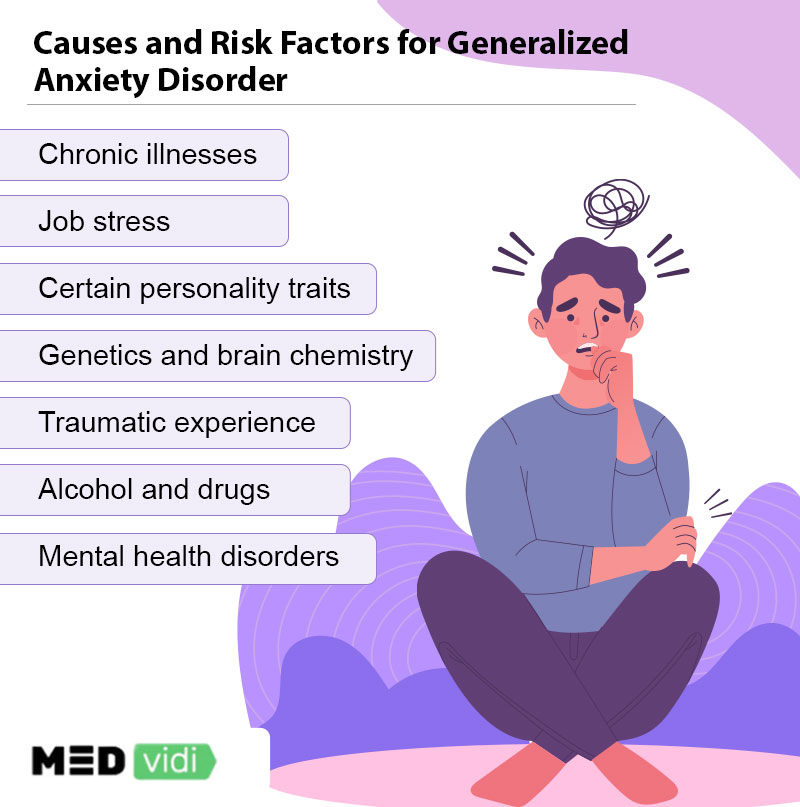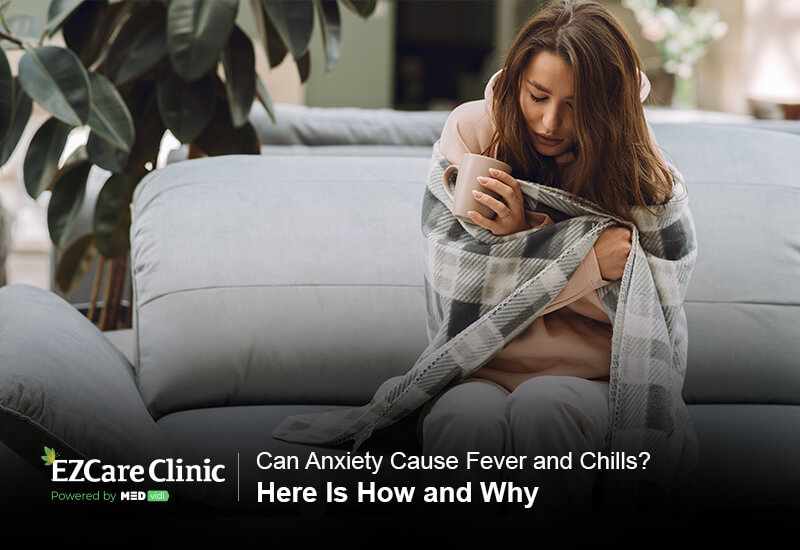It is normal to feel anxious when attending a job interview, taking a test, or making significant life changes. Such sensations may arise in response to stress and danger, and for most people, they are temporary.
However, those feelings are more serious for a person with an anxiety disorder to the point of interfering with daily life. One may experience too much worry, fear, and tension. Their anxiety persists even after the danger has passed and is often disproportionate to the threat one faces.
About
Anxiety may become an obstacle to living a happy life. Manage the symptoms with the help of certified professionals at MEDvidi.
Consequences and Symptoms of Anxiety
According to the Anxiety & Depression Association of America, people with anxiety are six times more likely to have other psychiatric disorders (depression is its most common comorbid condition). In some cases, the person will have occasional headaches, feelings of weakness, tiredness, and irritability. In the worst cases, panic attacks will occur.
Below are the most common anxiety symptoms:
- Feeling tense or nervous
- Racing thoughts of potential danger
- Trembling and shaking
- Breathing fast
- Hypertension
- Fast heart rate
- Sweating
- Trouble falling asleep
- Too much worry that makes it hard to concentrate
- Irrational fears
- Avoiding anxiety triggers like social gatherings
Common Causes of Anxiety
The exact things that cause anxiety remain unknown. However, scientists have associated the development of anxiety disorders with the following factors.
Brain Chemistry
Anxiety has something to do with emotions and fear originating from the brain. Therefore, scientists believe that anxiety disorder may result from circuit problems in the part of the brain that controls emotions. Also, an imbalance between
Genetics
Like most mental disorders, anxiety can pass from parents to children. So the chances of getting it are higher if one of the parents or siblings has the condition. Also, some types of
Environmental Stress
Anxiety can result from what you’ve seen or experienced in real life. Some common triggers include childhood abuse, witnessing violence, and the death of a loved one.
Drug Abuse
Some drugs can reproduce the symptoms of anxiety. And if a person has a drug addiction, withdrawing from the substance(s) can trigger anxiety.
Medical Conditions
One can get anxiety from a medical disease, especially if it involves the heart, lungs, and thyroid. The disease can either cause anxiety or make the symptoms worse. People with mental illnesses, such as depression, ADHD, and bipolar, are also at a greater risk of having an anxiety disorder.
MEDvidi doctors will conduct a thorough evaluation of your symptoms to determine the root causes of anxiety and choose the right treatment.
Common Risk Factors for Anxiety
Besides the above causes, can you develop anxiety from factors like personality and lifestyle? The answer is yes.
- Being shy as a child
- Having low self-esteem
- Stress from chronic health problems
- Taking too much caffeine
- Poor lifestyles, such as isolation, unhealthy diet, and lack of exercise
Additionally, studies show that the

Is Anxiety a Symptom Itself?
Many things can cause anxiety disorder; however, anxiety itself can be a symptom of various mental conditions. Six of the most probable options include:
- Generalized anxiety disorder
- Obsessive-compulsive disorder (OCD)
- Panic disorder
- Post-traumatic stress disorder (PTSD)
- Social phobia
- Separation anxiety disorder
Unwanted thoughts, fears, and inability to handle social interactions can increase anxiety in a person. If the effects are unbearable and interfere with one’s daily life, it is recommended to consult a mental health professional to get online anxiety diagnosis and proper help.
Do you have any disturbing symptoms? MEDvidi doctors are ready to examine your mental health, make a diagnosis, and choose suitable treatment.
Seeking Treatment for Anxiety
A lot of people with anxiety disorders don’t seek treatment. Yet it’s much easier to manage the problem with professional help. A therapist can help determine what causes anxiety in your case, make a diagnosis, and prescribe medications (if required). Professional help can also include talk therapy. Additionally, you’ll need to practice stress management techniques, such as meditation, exercise, and healthy eating.
If you feel anxious for prolonged periods, it’s vital to seek a medical diagnosis. The sooner you seek treatment, the sooner you will know what can trigger anxiety, and the better you’ll be able to manage the condition.












